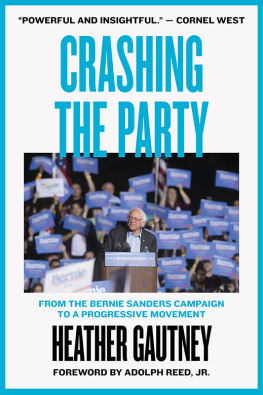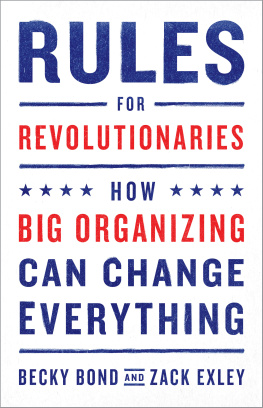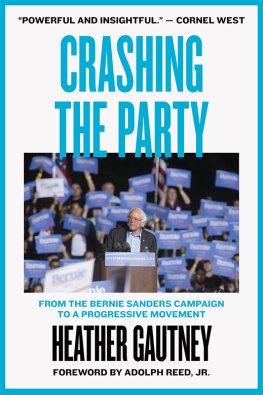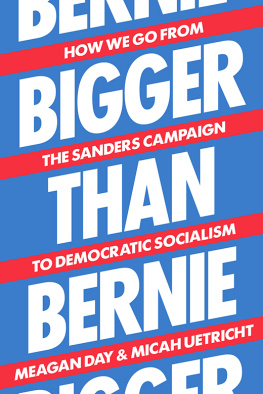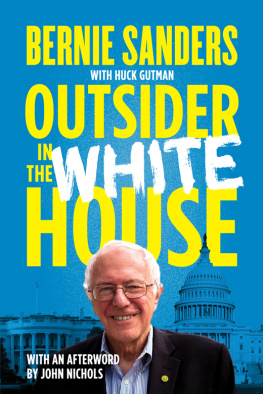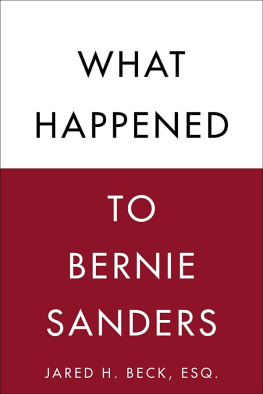Crashing the Party
From the Bernie Sanders Campaign
to a Progressive Movement
Heather Gautney
With a Foreword by
Adolph Reed, Jr.

First published by Verso 2018
Heather Gautney 2018
Foreword Adolph Reed, Jr. 2018
All rights reserved
The moral rights of the authors have been asserted
1 3 5 7 9 10 8 6 4 2
Verso
UK: 6 Meard Street, London W1F 0EG
US: 20 Jay Street, Suite 1010, Brooklyn, NY 11201
versobooks.com
Verso is the imprint of New Left Books
ISBN-13: 978-1-78663-432-0
ISBN-13: 978-1-78663-433-7 (US EBK)
ISBN-13: 978-1-78663-447-4 (UK EBK)
British Library Cataloguing in Publication Data
A catalogue record for this book is available from the British Library
Library of Congress Cataloging-in-Publication Data
A catalog record for this book is available from the Library of Congress
Typeset in Fournier by MJ & N Gavan, Truro, Cornwall
Printed in the US by Maple Press
For my mother, Diane Gautney
Contents
In the early spring of 2015, as the volume of chatter about the 2016 presidential race was increasing, I remarked to friends that my only interest in the process was that someone should remind me the day before the election to go vote for Hillary Clinton. That is how much it seemed a foregone conclusion that she would win the nomination and that we would once again be left to accept the only reason the neoliberal Democrats have offered most Americans to vote for them perhaps at least since Michael Dukakis: The Other Guy Is Worse (TOGIW). And the bases on which the other guy has been worse increasingly have had to do with the Republicans bold acceleration into horrible reaction. The dominant wing of the Democratic Party has been no less militarist or interventionist than Republicans; has reduced womens political concerns to abortion rights while even in that have forsaken principled commitment to reproductive rights for women in favor of a wan, focus-group tested support for choice; has limited concern with inequality largely to support for antidiscrimination and the sharply class-skewed celebration of diversity; has abetted, if not driven, the national attack on public education by corporate plunderers and their 501(c)(3) shock troops; and has all but openly expressed contempt for the working class of any race, gender, or sexual orientation.
Of course, spreading the idea that Clintons nomination was inevitable was part of her campaign strategy and has been a feature of Clintonism since Bill ran in 1992. Ever since she lost in 2008 to Obama, her supporters had laced that Clintonite entitlement with bourgeois feminism: it was her turn, many insisted, because the historic nomination of the first black president should be followed by the equally historic nomination of the first female president, as though that had been an implicit understanding on which the party united around Obama. Moreover, her supporters contended, she was on paper the most qualified candidate, based on the range and extent of prior government experience, educational attainment, and general wonkishnessin other words, her rsum of accomplishments rather than any compelling political vision.category, and a combination of TOGIW and friend-of-the-people-of-color posturing for the black, Latino, and other nonwhite voters. In retrospect, if not in prospect, it was clear that her candidacy and campaign brought together nearly everything that is inadequate, unsatisfying, and loathsome about the dominant wing of the Democratic Party from the standpoint of working peoples concerns and Left political interests.
In that context, the news that Bernie Sanders was considering entering the race for the nomination was noteworthy; he had always been a consistent voice on the left wing of Congress. As the focus of his campaign took shape over late spring and summer, it showed potential to assert a clear critique and program centering working peoples interests and concerns in the primary process. The Sanders campaign seemed to constitute a flashpoint to help galvanize labor and Left forces that have been dissatisfied for decades with the Democrats neoliberal presumptions about the horizon of the possible; it could be a significant step toward building the working-class-based, institutionally grounded political voice necessary to disrupt the nearly forty-year, increasingly bipartisan commitment to the primacy of corporate and financial sector interests and a regime of steadily intensifying upward redistribution. Formation of the Labor for Bernie group also attested to that potential.
From that point the story is well known. Few of those active in the campaign early on were convinced that Sanders had better than a punchers chance to win the nomination, although many thought that he was a better bet to win in November than to win the nomination. To wit, in late fall Labor for Bernie scheduled its first large public meeting for April 1, 2016, on the assumption that the campaign would most likely be over by then, so that it would have been a good occasion to discuss next steps. Instead, the campaign was still very much alive at that date, and even those who had more modest expectations wondered how far it could go. The meeting focused mainly on ways to mobilize for coming primaries and to do whatever needed to be done to keep it alive for as long as possible.
One of the most intriguing facets of the Sanders effort was its innovative attempt to use a national election campaign to support and stimulate a movement-building project, because the two operate off quite different, in fact opposing, logics. Electoral action is all about mobilizing and connecting with existing constituencieswhich means in practical terms addressing people who understand themselves more or less consciously as motivated around a given set of issues parsed and articulated in familiar ways. A serious electoral campaign, despite what many nominal leftists like to believe, must have as its paramount concern aggregating the greatest number of votes possible. At the most mundane level of door-knocking outreach, that translates into a warrant to resist tarrying in conversation with voters; the goal is to cover as much targeted territory and drop as much candidate literature as possible. The electoral imperative also impels toward formulating a message that communicates as widely as possible, favoring condensation symbols that evoke affective states over specific programs. In that sense electoral action can be more effective for demonstrating power that has already been won on the plane of social movement organizing than about movement building.
By contrast, organizing operates within a longer, less urgent, and more open-ended time horizon. Its objective is to build relationships of standing, which requires patient, intensive face-to-face interaction over time.which includes many who are routinely characterized as middle class by virtue, for example, of homeownership or white-collar employment.) Sanders showed in dramatic fashion what some on the Left have insisted for a long time, that very many Americans of all races, genders, and sexual orientations feel that their concerns, worries, and aspirations are ignored by both political parties and that they will respond affirmatively to voices that do attempt to connect with them.
For fifteen years or more I was part of an effort to build an independent Labor Party that rested on precisely that conviction. Our last major undertaking was a successful campaign to win an official ballot line for a South Carolina Labor Party. We selected South Carolina because we To that extent our effort was directed in part toward those in the institutional labor movement and elsewhere who insisted that American working people would not respond to direct class appeals. If working-class South Carolinians responded favorably, we assumed, that might help counter the hesitance that we attributed to more or less opportunistic or demoralized inclinations to underestimate the working class. We succeeded; more than 16,500 registered voters in the state, the vast majority of them working people, officially recorded support for recognition of a South Carolina Labor Party to articulate and advance an agenda important to them.

